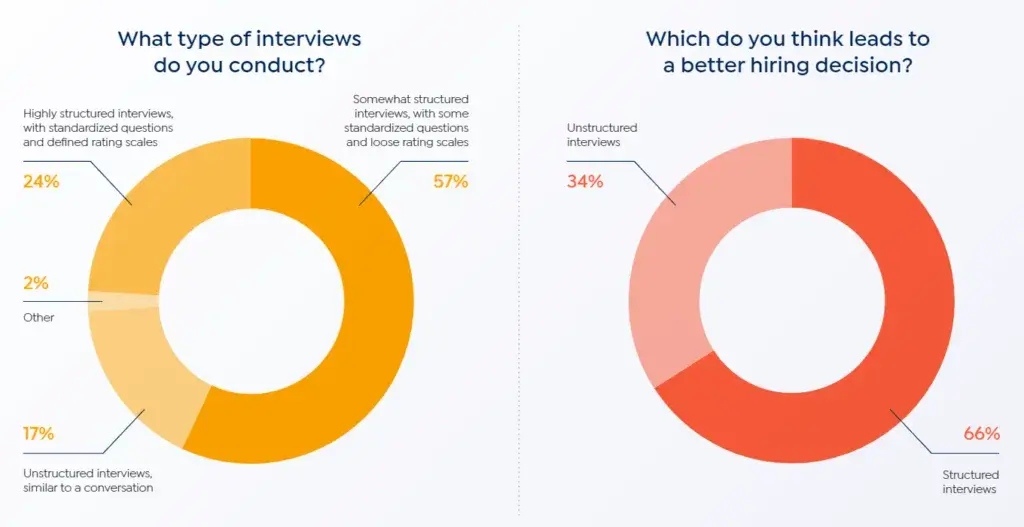The latest research suggests that structured interviews are the single strongest predictor of future job performance. This style of interviewing is more than twice as predictive as its unstructured cousin, the conversational interview. We wanted to gain insight into the popularity of different interviewing styles, and how hiring professionals feel they compare to one another.
As a part of our 2022 Hiring Benchmark Report, we asked more than 500 hiring professionals across industries about the types of interviews they conduct when evaluating candidates. We found that just 24% – less than a quarter! – of respondents were using tightly structured interviews with defined rubrics and preselected questions, despite how highly predictive structured interviewing is.
At 57%, the majority of hiring professionals conduct loosely structured interviews, asking most candidates similar questions and using a rough rating scale to gauge answers. 17% use conversational interviews that contain little-to-no structure.
Interestingly, when we asked people which they believe leads to better hiring outcomes, 66% of respondents said that they think structured interviews lead to improved talent decisions.

So why is there such a large disconnect between understanding that structured interviews yield better results and actually making them a part of the hiring process? There could be a few reasons.
First, many employers may believe that they are already using a highly structured interviewing style, even when they aren’t. To conduct a tightly structured interview, you need to make your interview process as comparable as possible. Meaning: all candidates are asked all the same (job-relevant!) questions, and all their responses are evaluated using the same well-defined rating scale. This process helps to eliminate bias and make your hiring process more equal for every candidate who goes through it. So what may be happening is that hiring managers believe a somewhat structured interview is good enough to find the best candidate for the job.
Second, many hiring professionals may feel that the process to put structured interviewing into practice will take too much time and effort to implement. While structured interviewing does require an upfront time investment to select questions and develop a rating scale for responses, it’s worthwhile because the evaluation process will yield both a higher quality of hire and a more streamlined evaluation process. If you’re interested in making structured interviewing a part of your hiring process, we put together a simple step-by-step guide you can use to get started!
Finally, it seems that some people may not be convinced that structured interviews are the way to go, with 34% of our respondents feeling that unstructured interviews lead to better hiring decisions. This likely stems from the misconception that a structured interview is cold and robotic, or limit the scope of their interviewing process. While it’s fair that a conversational interview may feel “more human,” it is also introducing a wealth of human error and bias to the hiring process. Since interviewing is already rife with opportunities for unintended bias, working to mitigate this bias is key to making your hiring process more fair and equitable for all.
Even if everyone isn’t on-board with the idea quite yet, structured interviewing has been shown to be a valuable practice, backed up by science as a better predictor of on-the-job success. To discover more hiring trends, download your copy of the 2022 Hiring Benchmark Report today.





